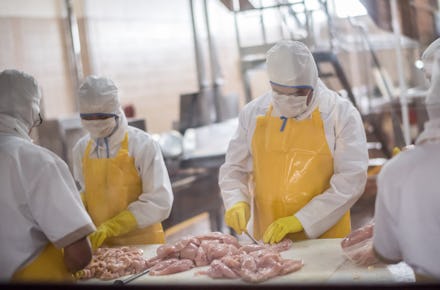Tyson Food managers allegedly bet on which employees would catch coronavirus

Meat processing plants, as you might be able to tell from headlines over the past few months, are largely responsible for keeping our food supply chain going right now. Many of them have been rriticized for not implementing sufficient safety precautions, amongst other malfeasances. The latest news of bad behavior comes via beef, poultry, and pork processors Tyson Foods, who are facing claims that their manager created a betting pool of how many employees would test positive for the virus.
The plaintiff in the lawsuit is the son of the now deceased Isidro Hernandez, who contracted coronavirus while working at Tyson Foods’ Waterloo, Iowa, facility. The younger Hernandez’s suit claims Tyson managers engaged in "fraudulent misrepresentations, gross negligence and incorrigible, willful and wanton disregard for worker safety." The suit mentions the executives involved allegedly by name and include the chairman of Tyson, the CEO, the president, another president, managers, and, ironically, the safety lead of Tyson.
One manager in particular is to blame for the idea, according to one portion of the lawsuit: "Defendant Tom Hart, the Plant Manager of the Waterloo facility, organized a cash buy-in, winner-take-all betting pool for supervisors and managers to wager how many employees would test positive for COVID-19," the lawsuit says according to CBS News.
Curiously, there is no mention of how Hernandez’s son found out about the alleged pool, but if these executives really did take bets on human lives they are supposed to protect, they're callous enough to probably talk about it publicly, one would wager.
According to the CDC’s critical infrastructure guidance, factory workers may be permitted to continue to work following potential exposure to coronavirus disease provided they remain asymptomatic, virus-free according to COVID-19 screenings, and are being careful. The Hernandez lawsuit alleges several instances where Tyson management fought to keep the factory open and the workers processing, despite potential exposures, even lobbying a politician in order to change a law to keeping the federal government from closing their facility.
Documents also report that there is a witness, Black Hawk County Sheriff Tony Thompson, who advised the company to shut the Waterloo plant, but it didn't, saying the plant's working conditions "shook him to the core.”
This isn’t the first time a purveyor of grocery meats has been accused of treating their employees like the chattel they process: the New York Times interviewed a Sudanese expat and Smithfield pork employee who witnessed firsthand her coworkers being infected one by one while management stood by, leading to one of the biggest outbreaks in an American meat processing plant this year. Meat processing plants in the Midwest are usually staffed with recently transplanted immigrants and undocumented workers, and we know how big corporations have a penchant for taking advantage of the vulnerable.
Tyson Foods didn’t directly respond to the lawsuit but released a statement outlining a laundry list of precautions they’re taking. One part stated, “Our company formed a coronavirus task force in January and began educating our team members — in multiple languages — about the virus.”
Even if Tyson relaxed their attendance policy and allowed team members to stay home if they didn't feel well, they could have also had a coronavirus betting pool. I’m not a lawyer, but that behavior falls into some pretty dicey and inhumane territory.